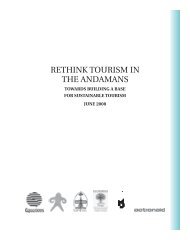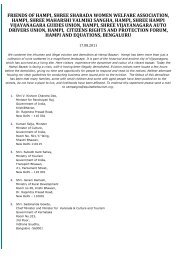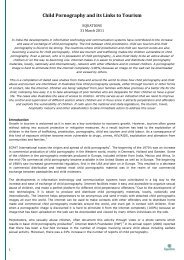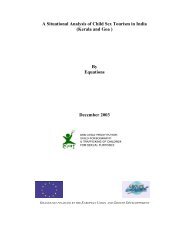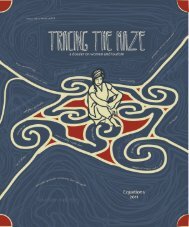Claiming the Right to Say No-30 Nov 09-EQUATIONS - Equitable ...
Claiming the Right to Say No-30 Nov 09-EQUATIONS - Equitable ...
Claiming the Right to Say No-30 Nov 09-EQUATIONS - Equitable ...
You also want an ePaper? Increase the reach of your titles
YUMPU automatically turns print PDFs into web optimized ePapers that Google loves.
<strong>Claiming</strong> <strong>the</strong> <strong>Right</strong> <strong>to</strong> <strong>Say</strong> <strong>No</strong><br />
experience. This attention <strong>to</strong> <strong>the</strong> narrative structure of our experience<br />
allows us <strong>to</strong> understand how a society collectively attempts <strong>to</strong> organize<br />
itself. The study of narrative has a long his<strong>to</strong>ry with significant<br />
developments in recent times. In literature, we can trace <strong>the</strong> work of<br />
Wayne Booth and Kenneth Burke, Robert Scholes, Robert Kellog, Frank<br />
Kermode. The French structuralist literary <strong>the</strong>ory also featured a strong<br />
emphasis on <strong>the</strong> narratives. Basing <strong>the</strong>ir work on eastern European<br />
linguists, such as Vladimir Propp and Roman Jakobson, French scholars<br />
like Roland Bar<strong>the</strong>s, A.J Greimas and Claude Bremond, have produced<br />
significant studies of narrative structure. The work of Hayden White<br />
attempted <strong>to</strong> demonstrate <strong>the</strong> narrative character of his<strong>to</strong>ry. Thus, <strong>the</strong><br />
analysis of <strong>the</strong> narrative that centred on <strong>the</strong> literature and structuralism<br />
embraced his<strong>to</strong>ry and demonstrated that we are bound by culturally<br />
shaped rules that guide our ‘s<strong>to</strong>ry-telling’. These rules provide narrative<br />
coherence and let us think that <strong>the</strong>re is a natural relationship between <strong>the</strong><br />
narrative and <strong>the</strong> real world. But, <strong>to</strong> attribute narrative coherence <strong>to</strong> real<br />
events is, according <strong>to</strong> some scholars, wishful thinking at its best. Thus<br />
<strong>the</strong> narrative is incapable of capturing and representing <strong>the</strong> world. That is<br />
why, Paul Ricoeur teaches that narrative opens us <strong>to</strong> ‘<strong>the</strong> realm of <strong>the</strong> ‘as<br />
if’. This means narrative introduces something new, and what it introduces<br />
is a syn<strong>the</strong>sis of <strong>the</strong> heterogeneous. It re-describes <strong>the</strong> world. Thus,<br />
narrativization dresses up reality, <strong>to</strong> put across a moral view of <strong>the</strong> world<br />
in <strong>the</strong> interest of power and manipulation.<br />
The fact that <strong>the</strong>re is a distance between <strong>the</strong> real world and <strong>the</strong> narrative<br />
should not make us think that <strong>the</strong>re is no link between narrative and our<br />
daily life. Indeed narrative arises out of and is pre-figured in certain<br />
features of life, action and communication and are successfully ordained<br />
<strong>to</strong> control, manipulate and order human experience.<br />
Enthusiastic Narrativists contend that we receive our identity as persons<br />
and derive <strong>the</strong> content of our obligations, rights and responsibilities from<br />
<strong>the</strong> narratives embraced by our communities. This view might be greeted<br />
as narrativist imperialism yet <strong>the</strong> place, <strong>the</strong> power and <strong>the</strong> importance of<br />
narrative cannot be brushed aside as it forms <strong>the</strong> character-and- conduct-<br />
2





